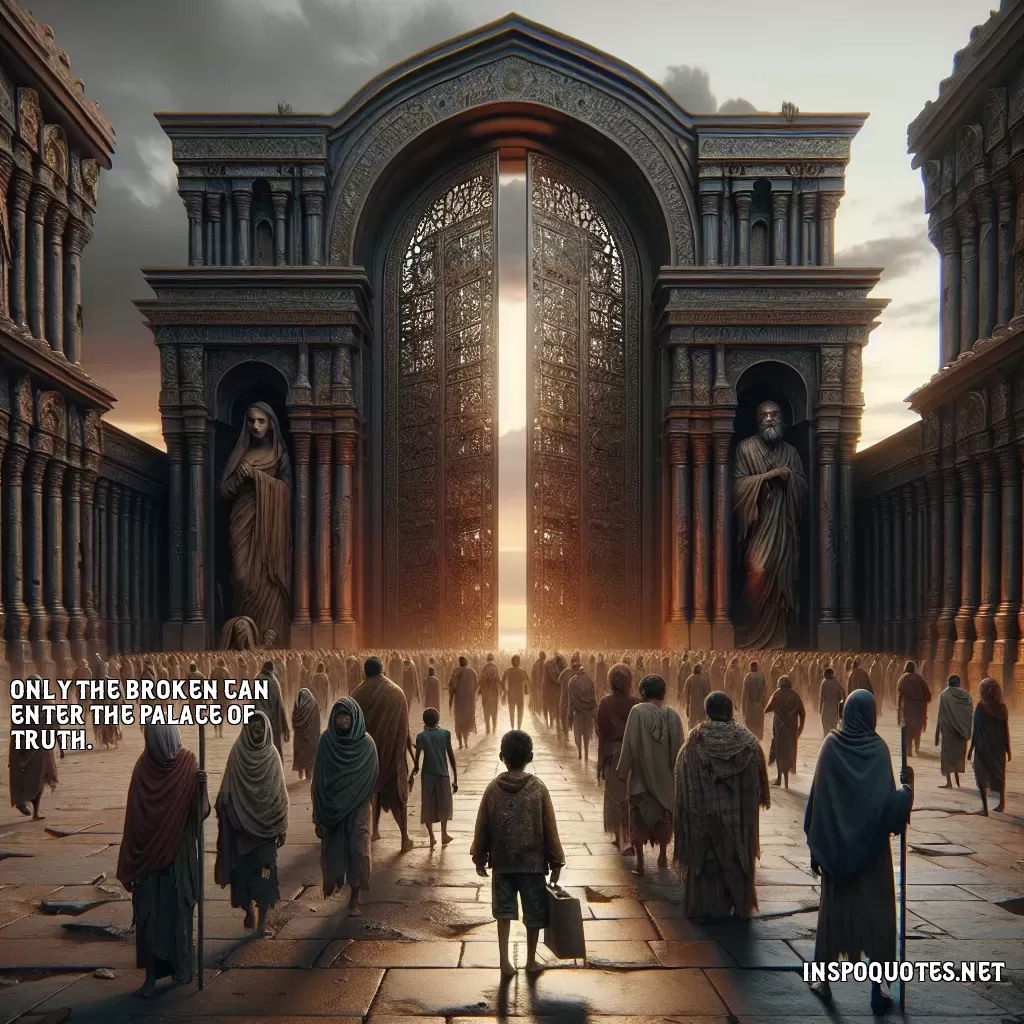
Only the broken can enter the palace of truth.
Author: Hanan al-Shaykh
👁️ 13 views
The quote "Only the broken can enter the palace of truth" speaks to the idea that true understanding and enlightenment often come from suffering, vulnerability, and a sense of being spiritually or emotionally “broken.” It suggests that personal growth and the deepest truths about ourselves and the world are most accessible to those who have experienced hardship, loss, or inner turmoil. When someone is “broken,” they are often stripped of their illusions, pretenses, and ego, leaving them exposed yet open to authentic experiences and insights. Such a state of vulnerability can lead to significant personal transformation. The "palace of truth" symbolizes a place of profound wisdom and self-awareness, a realm where ultimate truths are revealed. To enter this palace, one must let go of superficialities and false securities. Experiencing brokenness can shatter limiting beliefs and force an introspection that reveals one's true values, desires, and purpose. It necessitates confronting uncomfortable realities, both within and outside oneself. Suffering has the potential to foster empathy, resilience, humility, and strength. These qualities are essential for seeing beyond our biases and for attaining deeper truths. Thus, the quote underscores the paradoxical nature of human development, suggesting that the path to wisdom and truth is not through unbroken success, but through struggles that demand a reevaluation of who we are and what we hold true. This transformational process allows individuals to enter the metaphorical "palace of truth," marked by clarity, authenticity, and an enriched understanding of life.
Quote By: Hanan al-Shaykh
Hanan al-Shaykh is a prominent Lebanese writer and novelist, born on November 12, 1945, in Beirut, Lebanon. Known for her poignant exploration of women's rights, identity, and cultural conflict, al-Shaykh has secured a significant place in contemporary Arab literature. She grew up in a conservative society, navigating the complexities of a post-colonial Arab world, which shaped her literary voice and thematic concerns.
Al-Shaykh began her career in journalism, writing for various Lebanese publications during the 1960s. However, her passion for storytelling soon led her to fiction. Her first novel, "The Story of Zahra," published in 1980, is an autobiographical narrative that dives deep into the emotional and psychological turmoil faced by a young woman during the Lebanese Civil War. The novel was groundbreaking for its candid depiction of women's experiences in a war-torn society and established al-Shaykh as a powerful voice in the Arab literary scene.
As a prolific author, Hanan al-Shaykh has written multiple novels, short stories, and essays. Her works are often characterized by a blend of realism and magical realism, depicting the struggles of women against oppressive societal norms. "Women of Sand and Myrrh," published in 1992, is one of her notable works that highlights the lives of women in the Arab world, dealing with themes of love, betrayal, and resistance.
Throughout her career, al-Shaykh has received numerous awards and accolades, including the Arab Literary Prize. Her writings have been translated into various languages, allowing her to reach a global audience. Her bold narratives challenge stereotypes and provide nuanced perspectives on Arab women's lives, making al-Shaykh an essential figure for understanding contemporary Arab literature and culture.
Residing in different parts of the world, including Egypt and the Gulf, Hanan al-Shaykh continues to write and engage in cultural discussions, inspiring new generations of writers and readers alike. Her legacy endures through her powerful storytelling and commitment to illuminating the complexities of women's lives in the Arab world.